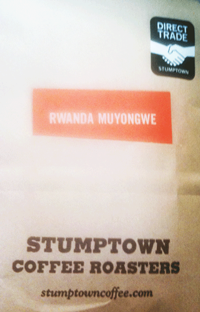Rwanda’s coffee success story
 A walking tour through some of the trendiest coffee shops in the NYU vicinity reveals a common element: creatively packaged, expensive Rwandan coffee for sale.
A walking tour through some of the trendiest coffee shops in the NYU vicinity reveals a common element: creatively packaged, expensive Rwandan coffee for sale.
Given our long-standing interest in 1) good coffee and 2) the potential of entrepreneurship for development, this phenomenon clearly merited investigation. The work of Karol Boudreaux, who has been following the Rwandan coffee sector for several years, helps to sketch the outlines of a partially donor-funded development success story now unfolding.
The history of coffee in Rwanda is intertwined with the country’s political fortunes, and stretches back to the 1930s when the Belgian colonial government required Rwandan farmers to plant coffee trees, while setting price restrictions and high export taxes, and controlling which firms could purchase coffee. These policies helped create a “low-quality/low-price trap” that would bedevil the post-colonial governments that continued similarly heavy-handed policies. They also ensured a national distaste for the stuff—reportedly even today many Rwandans prefer tea.
In the late 1980s global coffee prices plummeted, and the economic devastation following Rwanda’s 1994 genocide wiped out what remained of the struggling industry. In 2000, there was no functioning infrastructure to wash and process coffee beans, meaning that what little coffee was produced was of poor quality.
Fast forward ten years to today: Rwanda has a National Coffee Strategy. Rwandan specialty coffee is winning international competitions, commands some of the world’s highest prices, and is sought out by Starbucks, Green Mountain Coffee, Intelligentsia, and Counter Culture Coffee. There is preliminary evidence that the coffee industry is creating jobs, boosting small farmer expenditure and consumption, and possibly even fostering social reconciliation by reducing “ethnic distance” among the Hutus and Tutsis who work together growing and washing coffee.
How did this happen? First, the Rwandan government lowered trade barriers, and lifted restrictions on coffee farmers. Second, Rwanda developed a strategy of targeting production of high-quality coffee, a specialty product whose prices remain stable even when industrial-quality coffee prices fall. Third, international donors provided funding, technical assistance and training, creating programs like the USAID-funded Sustaining Partnerships to Enhance Rural Enterprise and Agribusiness Development (SPREAD). SPREAD's predecessor started the first Rwandan coffee cooperative as an experiment in 2001, and the project continues its work improving each link in newly-identified high-value coffee supply chains.
Some problems and constraints still plague the Rwandan coffee sector. For example, transport costs remain high, and poor management at some coffee cooperatives points to a persistent need for good training and financial management skills.
Still, Rwanda’s revenues from coffee are still growing in the face of global recession, and these revenues bring real benefits to Rwanda’s rural poor.
 From Aid to Equality
From Aid to Equality




